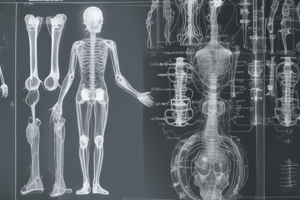Podcast
Questions and Answers
What is the key difference between 'mobile' and 'portable'?
What is the key difference between 'mobile' and 'portable'?
- Mobile machines are smaller in size, while portable machines are larger and heavier
- Mobile machines are used in surgery, while portable machines are used in emergency units
- Mobile machines are freely moveable, while portable machines can be carried or moved easily (correct)
- Mobile machines are ordered by the referring physician, while portable machines are not
When are mobile cases most common for technologists?
When are mobile cases most common for technologists?
- During the night shift and at the end of a day shift
- During the day shift and at the end of an overnight shift (correct)
- During the weekend shifts
- Throughout the entire workday evenly
What are some patient problems that can be encountered during mobile exams?
What are some patient problems that can be encountered during mobile exams?
- Limitations due to aseptic conditions and the presence of added critical equipment (correct)
- Language barriers and communication issues
- Financial difficulties and insurance complications
- Lack of transportation to the healthcare facility
What is the ideal positioning for mobile X-ray exams?
What is the ideal positioning for mobile X-ray exams?
What type of batteries are used in the battery-driven, battery-operated mobile X-ray units?
What type of batteries are used in the battery-driven, battery-operated mobile X-ray units?
What is the maximum charge time for the battery in the mobile X-ray unit?
What is the maximum charge time for the battery in the mobile X-ray unit?
What is the driving range of the mobile X-ray units?
What is the driving range of the mobile X-ray units?
What does the side marker on the X-ray cassette contain?
What does the side marker on the X-ray cassette contain?
What is the required Source-to-Image Distance (SID) for accurate X-rays?
What is the required Source-to-Image Distance (SID) for accurate X-rays?
What is the purpose of a portable marker in X-ray imaging?
What is the purpose of a portable marker in X-ray imaging?
What is the detector size of a mobile X-ray unit with Flat Plate Detector (FPD)?
What is the detector size of a mobile X-ray unit with Flat Plate Detector (FPD)?
What is the weight of a mobile X-ray unit with Flat Plate Detector (FPD)?
What is the weight of a mobile X-ray unit with Flat Plate Detector (FPD)?
What type of material is used in the scintillator of a mobile X-ray unit with Flat Plate Detector (FPD)?
What type of material is used in the scintillator of a mobile X-ray unit with Flat Plate Detector (FPD)?
What is the grayscale depth of the detector in a mobile X-ray unit with Flat Plate Detector (FPD)?
What is the grayscale depth of the detector in a mobile X-ray unit with Flat Plate Detector (FPD)?
What is the purpose of the wireless detector system in a mobile X-ray unit?
What is the purpose of the wireless detector system in a mobile X-ray unit?
What is the purpose of anatomical programming in a mobile X-ray unit with Flat Plate Detector (FPD)?
What is the purpose of anatomical programming in a mobile X-ray unit with Flat Plate Detector (FPD)?
Flashcards
Mobile vs. Portable Devices
Mobile vs. Portable Devices
Mobile devices can move on their own, portable devices are designed to be carried.
Mobile X-ray Use Cases
Mobile X-ray Use Cases
Emergency situations, patient transport, or locations lacking fixed X-ray units.
Patient Problems During Mobile Exams
Patient Problems During Mobile Exams
Discomfort, anxiety, and claustrophobia.
Ideal Mobile X-ray Positioning
Ideal Mobile X-ray Positioning
Signup and view all the flashcards
Mobile X-ray Unit Batteries
Mobile X-ray Unit Batteries
Signup and view all the flashcards
Mobile X-ray Battery Specs
Mobile X-ray Battery Specs
Signup and view all the flashcards
X-ray Cassette Side Marker
X-ray Cassette Side Marker
Signup and view all the flashcards
Optimal Source-to-Image Distance (SID)
Optimal Source-to-Image Distance (SID)
Signup and view all the flashcards
Portable Marker Purpose
Portable Marker Purpose
Signup and view all the flashcards
FPD Detector Size
FPD Detector Size
Signup and view all the flashcards
Mobile X-ray Unit with FPD Weight
Mobile X-ray Unit with FPD Weight
Signup and view all the flashcards
FPD Scintillator Material
FPD Scintillator Material
Signup and view all the flashcards
Grayscale Depth of Detector
Grayscale Depth of Detector
Signup and view all the flashcards
Wireless Detector System Purpose
Wireless Detector System Purpose
Signup and view all the flashcards
Anatomical Programming Purpose
Anatomical Programming Purpose
Signup and view all the flashcards
Type of Battery
Type of Battery
Signup and view all the flashcards
Study Notes
Mobile vs Portable
- The key difference between 'mobile' and 'portable' is that mobile devices are vehicles that can move on their own, while portable devices are designed to be carried or moved.
Mobile Cases for Technologists
- Mobile cases are most common for technologists during emergency situations, patient transport, or in areas where a fixed X-ray unit is not available.
Patient Problems during Mobile Exams
- Patient problems that can be encountered during mobile exams include discomfort, anxiety, and claustrophobia, requiring technicians to be adaptable and empathetic.
Ideal Positioning for Mobile X-ray Exams
- The ideal positioning for mobile X-ray exams involves aligning the X-ray beam with the body part being examined, ensuring proper patient positioning and minimal movement.
Mobile X-ray Unit Batteries
- Mobile X-ray units use sealed lead acid batteries, which are reliable and require minimal maintenance.
Battery Charge Time and Driving Range
- The maximum charge time for the battery in a mobile X-ray unit is typically 2-3 hours, with a driving range of around 100-150 miles.
X-ray Cassette and Side Marker
- The side marker on the X-ray cassette contains a lead identifier with the patient's name and other identifying information.
Source-to-Image Distance (SID)
- The required Source-to-Image Distance (SID) for accurate X-rays is typically 40-45 inches, ensuring optimal image quality.
Portable Marker in X-ray Imaging
- The purpose of a portable marker in X-ray imaging is to identify the patient and provide additional information about the exam, such as the date and time.
Mobile X-ray Unit with Flat Plate Detector (FPD)
- The detector size of a mobile X-ray unit with Flat Plate Detector (FPD) is typically 14x17 inches, with a weight of around 265 pounds.
- The scintillator material used in the FPD is cesium iodide, which provides high-quality images with minimal radiation exposure.
- The grayscale depth of the detector in a mobile X-ray unit with FPD is 14 bits, allowing for high-contrast images with detailed information.
Wireless Detector System
- The purpose of the wireless detector system in a mobile X-ray unit is to enable easy and efficient image capture, with minimal cables and setup requirements.
Anatomical Programming
- The purpose of anatomical programming in a mobile X-ray unit with FPD is to optimize the X-ray beam and technique for specific anatomical regions, ensuring accurate and high-quality images.
Studying That Suits You
Use AI to generate personalized quizzes and flashcards to suit your learning preferences.




